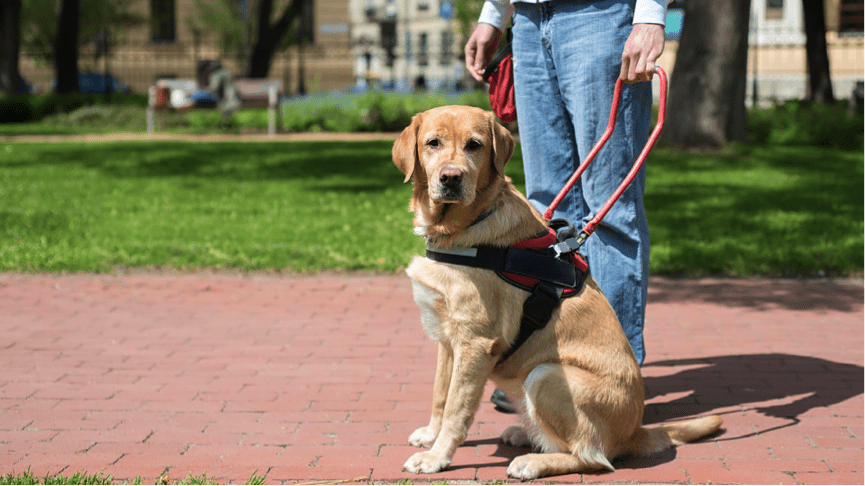Service dogs are essential for a lot of people who suffer from long-term health conditions. They help provide assistance, care, and support to their owner. From diabetes and autism to multiple sclerosis and fibromyalgia, there are lots of conditions that someone might be suffering from that can allow them to get the support of a service dog.
Service dogs are classed as working dogs and can be with their owner in many situations and environments. However, like everything, there are laws that need to be followed. This is for the safety of the service dog, their owner, and the public. Existing laws around the world for service dogs will specify what equipment they should have to support their use and what they should be wearing, for example, a vest that has writing on it saying ‘working dog, please do not pet’.
Below are the laws that currently exist in Virginia for service dogs. The laws come under Virginia’s Disability Rights Law and the Federal Americans with Disability Act (ADA). The law states that people with disability can bring their services animals to all public accommodations. This includes:
- stores
- businesses
- motels
- restaurants
- theatres
- schools
- many more places that are open to the public
Rules In Public Places
Public places have to follow the laws and allow entry to service dogs under the state
In Virginia, under the Disability Rights Law, public places have to give access to guide dogs, hearing dogs and service dogs. It states that service dogs are trained to do work or tasks for the benefit of a person with a disability. This work must be related to the person’s disability and includes retrieving items, altering allergies, assisting the owner during falls or serious emergencies and interrupting destructive behavior.
Virginia’s laws do not include service dogs for emotional support. The law states how animals provide emotional support, comfort, and well-being does not qualify as a working dog for someone with disabilities. Even if this is part of the benefits that someone with a service dog recieve, this cannot be a stand alone reason for getting a service. When visiting a public plaace, by the laws in Virgina, only service dogs providing physical support, as stated above, are allowed into the premisies.
What a service dog should carry or wear
It is the law in Virginia that all service dogs have a backpack, harness or vest that identifies that they are a trained service dog. Under the American Disability Act, a public place should not ask the owner of the service dog about their disability or demand to see proof. Public places should not charge any extra costs for having a service animal on the premises. The only charges that can occur are if the animal itself causes damage.
Service dogs can be told to leave a public place if they are causing a potential threat to others for medial if they barking or snapping at others or out of control. However, service dogs go through tough, orient training and will rarely act like this.
Housing
Laws in Virginia, both the Federal Fair Housing Act and Virginia Law prohibit anyone discriminating against someone having a service animal in their home. Landlords should always allow full and equal access to all housing types and should not charge extra for having a service dog on the premise. When a lease or rental has ‘no pets’ in the policy, this does not apply to have a service animal.
Services Dogs in Virginia
There are a number of different service dogs in Virginia accommodating a range of different conditions. Diabetic Alert Dogs are trained by Service Dogs of Virginia to detect and become art to low blood sugar for owners with Type 1 Diabetes. When someone with Type 1 Diabetes has low blood sugar, they can become hypoglycemia which is very dangerous. Service dogs can help to prevent someone from becoming extremely low by altering them when their blood sugar is dropping thus preventing a hypo. However, people with type 1 diabetes cannot be reliant on their service dog and have to show that they have good management over their type 1 diabetes treatment. They must meet the criteria before receiving a service dog.

